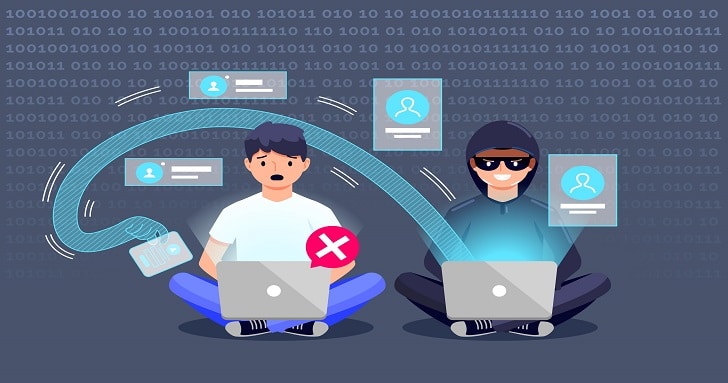Are you worried that your personal information could be easily hacked? Here we will help you to prevent hackers from stealing your data.
So that you will be back to sleeping soundly in no time. But first of all, let’s understand what hacking is and how it may occur.
What is hacking and how does it occur?
Hacking is an attempt to exploit your private network or your computer system. Simply put, hackers look for vulnerabilities within a computer system or network to infiltrate it. Hackers can easily steal and destroy your personal information and data. They can ask for money in exchange for keeping your sensitive data a secret, or they can sell it on the dark web right away. They can also use it to breach your identity and commit crimes under your name.
We often hear people say misconceptions like “I don’t have anything interesting on my computer” and “of all the computers out there, why would they choose mine?” But certainly, your device contains your personal or business information that hackers want to get into such as passwords, credit card numbers, photos, and private documents. Even your browsing history and login credentials could be extremely valuable.
Basic steps for safer browsing:
Now let’s learn what steps should be taken to protect yourself. First of all, run a virus scanner on your computer regularly. We tend to forget about this but it’s necessary to check the device and see if there are any vulnerabilities in the system.
Also, it’s a good idea to install the HTTPS Everywhere and Privacy Badger browser extensions. The latter stops third parties and advertisers from tracking your Internet activity.
Here is certain advice to follow:
Always prefer to visit sites that have ‘HTTPS://’:
Get in the habit of always checking the URL of the page you are visiting. It must be the same as the site you want to visit – check every letter. The domain name (e.g. “ny.superstore.com”) should only be preceded by https://. Those websites that have https:// are the most encrypted and secure to browse and access.
The danger of Free Wi-Fi:
We admit it, it’s tempting. Unfortunately, it is not only tempting for you but also for many hackers. A rogue access point is easy to set up, and while you are off guard with your laptop and sipping coffee in silence, they take off with your login details.
Instead, you can use your mobile data to browse or connect through an encryption platform. With encryption, your information is replaced by other characters, rendering the original data unrecognizable. Intruders cannot decrypt your data without the key that is available only to you.
Best password choice:
Sometimes it drives us crazy – you have to log into different platforms several times a day, and you probably have more than 10 accounts for various purposes. It is easier to use the same password every time. But of course, this is not a good idea. And, although it seems useful, it is better not to store your passwords in your browser either.
Instead, use a password manager. This ensures that you only have to remember one password and that the rest of your logins receive an extra-long, secure, and randomly composed passcode.
In case you decide to create each one manually, a good password should contain at least 12 characters and include numbers, uppercase, and lowercase letters. Do not include personal information, such as your date of birth.
Even if your password is very strong, you should not use it everywhere. If a hacker finds it out, they will be able to hack all the services in which you use this data.
Two-factor authentication, what is it?
Two-factor or multi-factor authentication is an electronic verification method in which the user has to present 2 or more pieces of evidence to an authentication mechanism to log into the account successfully.
Thus, two-factor authentication double-checks if it’s you via code via text or email.
But make no mistake. Hackers are getting better at responding to new technologies. Although 2FA is considered more secure than the traditional login and password method, there are potential weaknesses here as well. So check different kinds and options on your own device and choose the one which suits your exact needs better.
VPN:
VPN stands for Virtual Private Network. Therefore, it is a secure connection between your device and the internet.
A VPN connection guarantees to hide what you do on the internet from, among other things, your Internet provider and other snoopers. VPN has several advantages including securing your network and hiding your IP address. It’s also useful if you want to watch shows or news from other countries (which are restricted in yours).
DO NOT click on a suspicious link:
Have you received any suspicious links through your email, WhatsApp, or SMS? Then the first thing you should do is check the identity of the sender and get their details. For this, you can use Nuwber. On this site, you can check all the details of the sender including name, address, phone, and much more. That will help with understanding where the link comes from in the first place.
Another thing to do is NOT to click on the link but to copy it and paste into the search bar without hitting ENTER. Check if the URL is the same as presented in the message. If it’s not – it’s probably malicious.
Overall, it’s better to fight your curiosity and ignore such links in general. Or ask the sender to provide the information in a different way.
In conclusion: now it’s time to act! Don’t wait until a hacking attack happens and start taking measures to prevent it from occurring right now. Hopefully, the message we want to convey is clear: stay alert, use common sense, and, above all, stay up to date on security trends.

